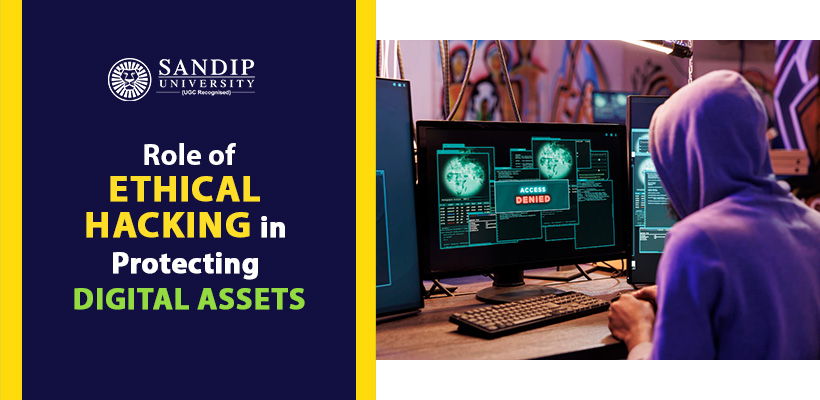We live in a world which is highly digitised and vulnerable to cybercrime. There is a constant need to emerge above malicious attacks in the cyberspace to ensure that our digital assets are protected from prying eyes. Many cyber security colleges in Nashik are offering comprehensive undergraduate and postgraduate programs in this field to develop future cyber security engineers and ethical hackers in the industry.
There is a lot of demand for skilled and talented professionals in this field to stay ahead of tackle cyber threats. Let us understand in depth about what exactly ethical hacking stands for, how they are different from unethical hackers, the skills and qualifications needed to make it in this industry, and future career opportunities upon graduation.
What is Ethical Hacking?
Ethical hacking is a lawful attempt to gain access to an unauthorised system to facilitate the understanding of unlawful actions undertaken by unethical hackers. These professionals are essential in the study of cyber security vulnerabilities that can be worked on before unethical hackers attempt to access the system.
Ethical hackers are the need of the hour to make a system fool-proof to cybercrime. Professionals who can think outside the box and find unique vulnerabilities in the security of a system are often in huge demand within the industry.
How do Ethical Hackers Differ from Unethical Hackers?
There is a world of difference between ethical and unethical hackers. While malicious hackers seek access to personal and private information for nefarious reasons, ethical hackers use the same techniques to look for weaknesses in cyber security strategies and eliminate such weaknesses. The end goal of ethical hackers is to not only identify cyber security threats, but also provide a viable solution to the organisation to safeguard its digital assets.
Some unethical hackers work for personal gain while others do it to create untold chaos and confusion. They can impact back-end servers, enable financial crisis, and engage in identity theft to malign a person’s reputation. On the other hand, ethical hackers are solely interested in identifying cyber security threats within a system and propose remedial solutions to fix the same.
How Does Ethical Hacking Help Protect Digital Assets?
Ethical hackers are employed by organisations to access and identify cyber security vulnerabilities in their operating system. Every organisation does its level best to safeguard the digital assets of its clients. For example, a banking institution will have to employ the best cyber security measures to ensure that their clients’ personal financial data does not fall prey to unethical hackers for criminal activities.
Ethical hackers play a vital role in safeguarding the reputation of such organisations and preventing loss of personal and professional data. Organisations that engage in sensitive research and development also need ethical hackers to prevent leak of data. For example, a company engaged in researching and developing military-grade equipment needs to protect its servers from unethical hackers to safeguard their designs and plans.
Qualifications and Skills Needed to Make it as an Ethical Hacker
Candidates who are interested in pursuing a career in ethical hacking need to train for years to make it in the industry. Educational qualifications and training go a long way in determining your success as an ethical hacker. B.Tech CSE in Cyber Security is one of the most popular undergraduate degree programs that can form the foundation to your training as an ethical hacker. This program is divided into eight semesters spanning four years. Candidates who have completed 10+2 in the science field from a reputed educational board with minimum 50% aggregate marks are eligible for this program.
Furthermore, you will need these skills to make it as an ethical hacker:
- Computer networking skills
- Programming skills
- Penetration testing skills
- Database management skills
- Cryptography
- Creative thinking and analytical skills
- Problem-solving skills
- Understanding of wireless networks
- Coding skills
- Developing a mindset for cyber hacking
Future Scope and Career Opportunities in Ethical Hacking
The future scope of ethical hacking is massive and growing exponentially. There is a huge demand for skilled and well-qualified professionals with a penchant for thinking outside the box. Many industries like banking and finance, defence, healthcare, government organisations, and social media require ethical hackers to weed out vulnerabilities in their systems.
These are some of the top jobs available in ethical hacking after completing a cyber security course in Nashik:
- Ethical Hacker
- Cyber Security Engineer
- Cyber Security Analyst
- IT Security Analyst
- Application Security Specialist
- Penetration Testing Consultant
- Network Security Engineer
- Information Security Manager
- Network Security Architect
- Data Privacy Specialist
Conclusion
The role of ethical hackers in protecting digital assets cannot be understated. They are a vital part of the cyber security network that help strengthen an organisation’s cyber security standards, and innovate newer ways to upgrade existing security standards. Many B.Tech Cyber Security colleges in Nashik offer excellent and globally-relevant qualifications in this field.
It is vital to pursue this program from a leading college to make sure that you have vast number of opportunities upon graduation. Today, there are many certification programs also available in cyber security. But nothing beats a degree program in terms of knowledge acquisition and skill development. Conduct necessary research to find the college that can give you well-rounded training in cyber security. The future is very bright for professionals holding the right qualifications and skills in this field. Good luck!

